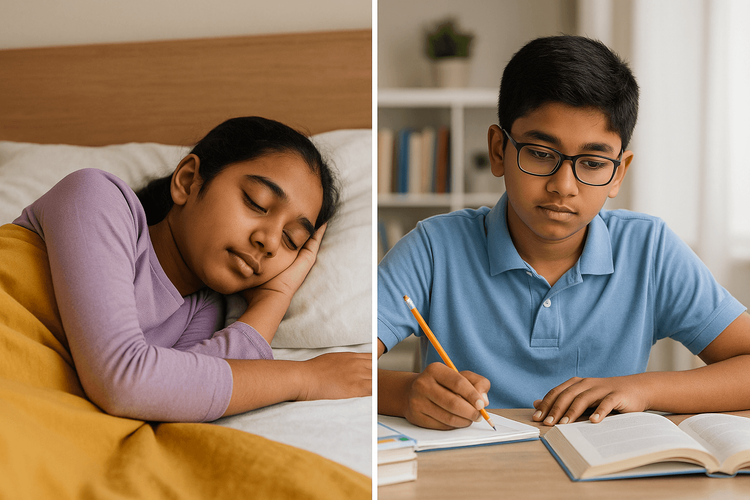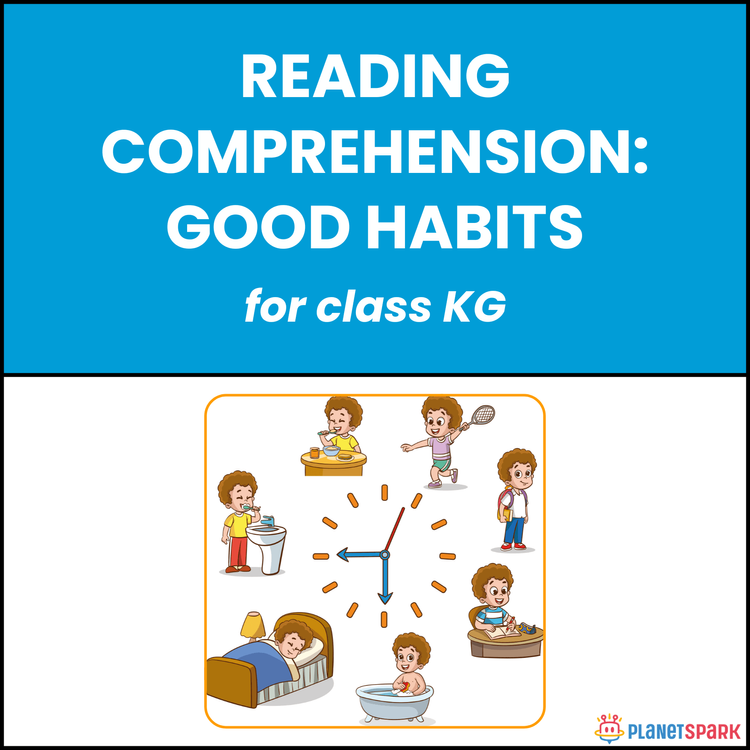How Many Hours a Student Should Sleep for Better Focus and Grades

Table of Contents
Sleep is a vital yet often neglected part of a student’s life. With exams, assignments, and busy schedules, many cut back on rest to study more, but this harms focus, memory, and academic performance. Quality sleep boosts attention, problem-solving, and recall, while sleep deprivation leads to fatigue and poor grades. In this blog, we’ll discuss how many hours students need at different ages, risks of sleep loss, and tips to build healthy sleep habits for academic success.
How Many Hours a Student Should Sleep
Getting the right amount of sleep is crucial for a student’s focus, memory, and overall performance. Knowing how many hours a student should sleep helps maintain a balanced routine that supports learning and well-being.
School Students (6–12 years): 9–12 hours for growth, memory, and immunity.
Teenagers (13–18 years): 8–10 hours to boost focus, emotional balance, and academic performance.
College Students (18+ years): 7–9 hours to enhance productivity, concentration, and stress management.
Proper sleep allows the brain to consolidate knowledge, improves problem-solving, and keeps students alert and motivated, leading to better academic outcomes and healthier development.
Why Sleep Is Essential for Students
Sleep is more than just rest, it’s a powerful process that helps the brain and body recover, recharge, and prepare for the next day. For students, getting the right amount of sleep is directly linked to academic success. While studying strengthens knowledge, sleep helps consolidate that information, making it easier to recall later.
During sleep, the brain organizes and stores new data, which boosts memory retention and learning capacity. A well-rested student can focus better in class, solve problems more effectively, and retain lessons for longer periods. On the other hand, lack of proper sleep can reduce attention span, making even simple tasks feel overwhelming.
Recommended Hours of Sleep by Age Group
Sleep needs vary depending on age, lifestyle, and growth stages. Getting the right amount of rest ensures proper brain development, better focus, and overall well-being. Below is a breakdown of the recommended hours of sleep for different student groups:
School Students (6–12 years): Should aim for 9–12 hours of sleep daily. This stage is crucial for physical growth, memory building, and strong immunity.
Teenagers (13–18 years): Need about 8–10 hours of sleep each night. Sleep supports hormonal balance, academic focus, and emotional regulation during this phase.
College Students (18+ years): Require 7–9 hours of rest. Adequate sleep improves productivity, concentration, and helps manage stress from studies and extracurriculars.
These requirements vary because younger children are still developing physically and cognitively, teenagers are undergoing hormonal changes, and college students need consistent rest to manage their busy schedules.

Quick Reference Table:
| Age Group | Recommended Sleep |
|---|---|
| 6–12 years | 9–12 hours |
| 13–18 years | 8–10 hours |
| 18+ years (college) | 7–9 hours |
Getting the right amount of sleep at each stage ensures healthier development, sharper focus, and better long-term health.
Effects of Sleep Deprivation on Students
Lack of proper sleep can significantly harm both academic performance and overall health. Students often sacrifice sleep for late-night study sessions, social media, or stress, but this leads to serious consequences:
Poor Concentration: Sleep deprivation reduces attention span, making it difficult to absorb and retain information.
Memory Issues: Inadequate rest disrupts memory consolidation, which directly affects exam performance and learning.
Lower Grades: Studies show that students who sleep less tend to perform worse academically compared to those with healthy sleep schedules.
Mood Swings & Stress: Lack of sleep increases irritability, anxiety, and emotional instability, impacting mental health.
Weak Immunity: Continuous sleep loss lowers resistance to illnesses, leading to frequent health problems and missed classes.
In short: Poor sleep habits don’t just affect grades but also impact a student’s physical health and emotional balance, creating a negative cycle.
Tips for Developing Healthy Sleep Habits
Getting enough sleep is important, but building the right habits ensures that your rest is truly restorative. Here are some practical tips every student can follow:
Maintain a consistent sleep schedule: Going to bed and waking up at the same time daily, even on weekends, helps regulate your internal clock.
Limit screens before bed: Avoid mobile phones, laptops, and social media at least 30–60 minutes before sleeping. Blue light from screens disrupts melatonin, the hormone that regulates sleep.
Eat smart and exercise lightly: A balanced diet improves sleep quality. Avoid heavy meals or caffeine close to bedtime. Light evening exercise like stretching or yoga can help relax your body.
Create a comfortable environment: Keep your room dark, quiet, and cool. A clean, peaceful environment signals your brain that it’s time to sleep.
Power naps vs. night sleep: Short power naps (20–30 minutes) can refresh your mind but should never replace a full night’s sleep. Prioritize longer, uninterrupted rest at night for memory retention and better focus.
By practicing these healthy sleep habits, students can improve concentration, boost energy levels, and perform better both academically and personally.

Balancing Study Time and Sleep
Many students believe that sacrificing sleep for extra study hours will improve performance, but in reality, it often has the opposite effect. Time management plays a vital role in balancing academics and rest. When students plan their day wisely, they can cover their lessons without needing to compromise on sleep.
Pulling “all-nighters” may help complete assignments or revise at the last moment, but it reduces memory retention, lowers focus, and hampers problem-solving abilities. Instead of pushing the brain beyond its limits, students should design study routines that fit within their natural sleep cycles.
A smarter approach is to divide study sessions into focused blocks, take short breaks, and prioritize quality over quantity. For example, reviewing lessons daily for shorter periods is far more effective than cramming overnight. By maintaining this balance, students can perform better in exams, stay energized, and protect their long-term health.
Learn More with PlanetSpark – Maximize Learning with Healthy Sleep Habits
Good sleep is the foundation for focus, better learning, and effective communication skills. At PlanetSpark, we help students combine healthy sleep routines with structured learning to maximize their academic potential and overall growth.
Personalized Learning: Guided programs help students develop consistent study habits, critical thinking, and communication skills.
Interactive Sessions: Engaging online classes make learning enjoyable while reinforcing structured study routines.
Focus on Academic Excellence: Lessons enhance understanding, retention, and problem-solving skills, complementing healthy sleep habits.
Practical Worksheets and Activities: Students practice concepts through exercises and real-life applications to reinforce learning.
Expert Mentors: Experienced teachers guide children through academic lessons and effective study strategies.
Flexible Learning: Online sessions allow students to learn at their own pace from home, making structured learning accessible and stress-free.
Help your child study smarter and perform better. Book a free trial at PlanetSpark now!
Conclusion
Adequate sleep is essential for every student’s focus, memory, and academic success. Sacrificing rest for extra study hours may seem productive, but it often reduces concentration, retention, and problem-solving abilities. By understanding the recommended sleep hours for different age groups and adopting healthy sleep habits, students can improve both their mental and physical well-being.
Balancing study time with sufficient sleep ensures that learners are alert, motivated, and ready to tackle academic challenges efficiently. Incorporating structured study routines, such as guided programs from PlanetSpark, along with proper rest, can significantly enhance performance, confidence, and overall growth.
Frequently Asked Questions
Students generally need 7–9 hours of sleep per night, though younger students may require more for proper growth and focus.
Yes, lack of sleep reduces concentration, memory retention, and problem-solving skills, negatively impacting grades and learning efficiency.
Ideally, students should maintain a consistent sleep schedule, going to bed and waking up at the same time daily, preferably early enough to get 7–9 hours of sleep.
Short naps of 20–30 minutes can refresh the brain and improve focus, but they should not replace full night sleep.
Quality sleep consolidates learning, strengthens memory, and enhances attention, making it easier for students to retain information and perform well academically.
Parents can promote consistent sleep schedules, limit screen time before bed, create a quiet sleeping environment, and encourage balanced routines with regular exercise and study.
Download Free Worksheets
Personalized Communication Report
Record a video to get a AI generated personalized communication report for your child

Hi There, want to try these
tips for your child with
LIVE with our expert coach?
Let's check your child's
English fluency

